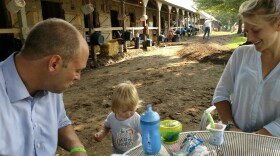As another summer meet at Saratoga Race Course approaches, thoroughbred horse racing advocates say the troubled sport is beginning a new era of oversight and accountability. The Horseracing Integrity and Safety Authority established by Congress in 2020 is overseeing efforts to implement standard and nationalized rules with respect to safety and doping. The authority’s new CEO is Lisa Lazarus.
To begin with, before we talk about some of the issues facing racing, can you tell our listeners a little bit about who you are and how you come to this position?
Sure. So I have a sort of relatively lengthy career in sports regulation, and particularly around anti-doping programs and disciplinary sports programs. I'm a lawyer by training. I started my career at a private law firm at Akin Gump Strauss Hauer & Feld, essentially in their Labor and Employment Division. After that I spent 10 years with the National Football League, primarily representing the 32 member clubs in collective bargaining issues, but also representing the teams in various disputes and arbitrations with the players, including the anti-doping programs and performance enhancing programs. After that I was the General Counsel of the International Equestrian Federation, and also their Chief of Business Development and Strategy. That was actually overseas in Switzerland, that was governing sport horses internationally. And then, the last four years prior to assuming the job of CEO of HISA, I created an equine law practice at a sports boutique law firm called Morgan Sports Law; I was representing owners, trainers, riders, primarily of sport horses. And then I took this role in February of 2022.
What appealed to you about this particular position?
A couple of things. One is I definitely have developed over my time working in equine law a passion for the horse and for horse welfare related issues. I think, you know, sports that involve a horse are extraordinary and bring so many benefits to the public, but also to the industries that they create. But obviously, that's also a real responsibility. And I'm sort of passionate about protecting the sports while, at the same time, making sure that the animals are protected. I also looked at it as an opportunity to have a real impact on an industry that I thought was a fantastic industry in sport, which obviously is horse racing, but also really could use some support and some assistance in terms of you know, making some regulatory changes that would help to secure its future going forward. You know, what was really interesting to me in particular is that horse racing is really the only sport that I know of that doesn't have a national or didn't until now have a national governing body. And I thought the opportunity to kind of create that, given the experiences that I've had over the course of my career, would be really unique and potentially very fulfilling.
If you could explain, what is the Horseracing Integrity and Safety Authority’s mandate and what is your role in implementing it?
Sure. So the Horseracing Integrity and Safety Act was passed by Congress, as you mentioned in December 2020. That Act creates the authority that I'm the CEO of with a mission to make racing safer, and to protect the integrity of horse racing. And really, the Act gives us two programs or essentially tools in order to fulfill that mission. One is the Race Track Safety Program, which really is all about enhancing both equine and also jockey or rider safety through various provisions and requirements that pertain to racetrack accreditation as well as various uniform safety rules that are in place to essentially, you know, protect our horses from fatalities and from injuries and also protect the riders. And the second program is the Anti-doping and Medication Control Program, which is there to essentially protect the integrity of the sport. And the Racetrack Safety Program is going into effect July 1, and the Anti-doping and Medication Control Program is going into effect January 2023.
How are you being received by the industry so far? I think it's fair to say racing has been a fairly insular world over the years.
What I'll say to that is, most stakeholder groups have been supportive of our mission, and supportive of what we're trying to accomplish. And we've had a tremendous amount of, you know, positive feedback from a lot of the bigger players in horse racing. You know, we've also had some trepidation and some anxiety from groups that, you know, are anxious to know what the future holds for racing, and aren't sure that HISA is going to actually sort of make a difference, a positive difference in their lives or in the industry. Obviously, we're going to have to show that we do bring positive impact, and that we are really there to inspire the sport and to help the sport, as I said, kind of be around for generations to come. But in that sense, I have to say, it's obviously been a little bit mixed, because, you know, we haven't gotten going yet. And change is always, I think, difficult for people.
You have mentioned two areas where you'll be concentrating — that's in racing safety and in doping. Is one of the two issues a bigger focus for you right now?
Well, neither are more important than the other, I think they are equally important. And they go and they work in tandem. That being said, because the Race Track Safety Program is operational July 1 and the Anti-Doping not until January 1, we're a bit more focused on the Race Track Safety Program and making sure that that launches properly and that we have everything in place to make sure it goes smoothly and to make sure we can properly enforce it. At the same time, the Anti-doping and Medication Control Regulations are currently up for public comment. And I'm collecting those comments and reviewing the rules from a substantive standpoint. So they're kind of equally important. But from a timing standpoint, they're sequenced differently.
What sort of changes are being discussed or on the table in terms of racetrack safety? What is meant by that specifically?
So you know, we have a number of different regulations that pertain to the race tracks. Things like surface testing, to make sure that the surfaces are at their optimal safety for horses, and for the riders who are on those horses. We're going to have a uniform crop rule, so that all states and all racetracks have the same rule involving the crop. We have enhanced veterinary reporting, so that we have a closer connection between what the veterinarians are seeing when they examine horses and their actual performances or their abilities to race. We have things like safety committees and safety inspectors that are required. Now, some of the racetracks are already doing this, but these regulations make those requirements national. So that's kind of a sampling.
Is it possible that not all racetracks or local authorities will be able to survive, given the increased level of scrutiny and standardization that you're talking about?
Well, so a couple of things about that I think are important to realize. For one, you know, HISA only has authority over covered horse races, which are thoroughbred horse races where the racetrack is exporting the signal for pari-mutuel wagering. So by definition, you have racetracks that have, obviously, income sources. But in addition to that, we've worked really hard to make sure that the changes we're requiring are changes that are accessible to racetracks, even if they need a bit more time, and that we can provide solutions to help them achieve those benchmarks. You know, one example I'll give is there were a few racetracks that expressed to us they were having difficulties providing baseline concussion tests for their jockeys prior to July 1. There are a lot of racetracks that provide this service for jockeys, some don't, and for some jockeys the additional couple hundred dollars a night that it might cost to get the test was prohibitive or was preventing them from registering.
So we went around to all of those tracks that couldn't provide that service and we provided it to them free of charge in a way that would enable their jockeys to have those tests, record those medical records and be compliant by July 1. But even more importantly, the reason we want those baseline tests is we want to be able to ensure that if a jockey does sustain a concussion, you know, sometime after July 1, that we have a baseline test to make sure that when they go to the hospital, they get optimal care. So that's sort of one example. We really tried to be cooperative and to figure out ways to enable racetracks to meet these standards in a way that's not going to put their future viability into question.
Let's change gears here and talk about the issue of doping now. How widespread is this problem in your estimation?
So you know, that's a really difficult question for me to answer and only because I really don't come from horse racing. My experience is primarily in the sport horse world. And we're building an entirely new program. So I think I'll only be able to answer that question after we've launched our program and it's been in place for a period of time to see what the outcomes are. I know that we're going to have more rigorous rules, we're going to have higher standards, we're going to have better sort of lab— let's say labs being similar to each other. So better harmonization of the labs, which I think will be an important ingredient in having a more kind of comprehensive, fair program. But I can't really answer that question until we have time to evaluate it.

You mentioned earlier that horse racing, unlike most other sports, doesn't have a national governing body. Is it fair to say that HISA is now that body?
Correct. HISA is now that body with regard to those sort of two buckets or areas of are described. One being Anti-Doping and Medication Control, and the other being racetrack safety. Everything else is still left to the state racing conditions to govern. But we now have a national governing body for those two areas.
And how many state commissions or individual racetracks are falling under that purview?
In terms of jurisdictions, there's 25 racing jurisdictions that currently fall under HISA’s purview as of July 1. That may change because, as I said, it's connected somewhat to the extent to which the racetrack engages in interstate wagering. That's obviously the connection to the commerce clause and to the federal regulation. And right now, at this point in time, it’s 25 states.
Do you think that racing can be held safely?
Of course I do. I wouldn't have taken this job if I didn't. I'm sure that racing can be held safely. And I genuinely believe that over time, once HISA’s taken effect, we're gonna see meaningful improvements in racetrack safety for both the horses and the people who ride and care for them.
And how will that be measured? Are we talking about issues like the spate of deaths that we saw on the California circuit a couple of years ago that led to the track being shut down? How will these changes be tracked?
So one of the things that that's really powerful and exciting about HISA is that we do have the authority to collect a lot of data. And that's something that we've been really steadfast about requiring is the entry of, you know, veterinary information relating to covered horses. And so that information will be anonymized, when we analyze it, but it will be analyzed in equine injury database, it'll be analyzed with regards to, as I said, the jockeys and riders and we're going to use that data to essentially try to create policies and sometimes really just advisories to the racing industry in order to ensure that we can always, you know, achieve the highest standards when it comes to safety. So really, a lot of it's going to be research based. And that's what's really exciting about HISA is that we can we now collect this research on a national basis.
Will this be a process that racing fans and patrons are aware of? Will they see a presence from the authority or from you at tracks around the country? Or how will that work?
So I mean, listen, for the most part, you know, state racing commissions, we've been able to reach agreements with the vast majority of them, so they are still the ones who have sort of control of day to day race day operations. But as you've said, HISA’s changes are meaningful changes, and they do go to these core issues of safety and integrity. And so you will start to see a bigger presence of the HISA team so as we as we grow up, and one thing that I probably didn't mention, but I should have is that, when I was hired, I was the first employee. So part of my job has been to build the team. And so as the team grows, and as we are able to do more and more, I think you'll definitely will see a greater presence.
How important is it for you to get it right for the future of the sport?
I think it's incredibly important. And I am happy to set that kind of bar very high for myself and for HISA. And it's because I'm not sure that we'll get this moment in time again. The people who—the persons and organizations that lobbied for HISA did so over very long period of time. And it was, you know, an important achievement for those groups to be able to have federal regulation around safety and integrity. And I'm not sure that if we don't get it right this time we'll get another chance. And I think that the industry is an extraordinary industry, and it deserves the opportunity to sort of be its best version of itself. And I think the horses also deserve it. And I think the public will judge us, as they should, by how much progress we make, and the standards that we're achieving.
Is there something to the idea of incentivizing good behavior at the track? And the reason I ask that is, you know, the sport’s most famous trainer Bob Baffert is currently suspended from New York racing tracks for the next year. And he's had his latest Kentucky Derby victory taken away. People who have talked to our station over the years have described the dynamics in racing as sort of a race to the bottom where bad behavior is rewarded in the form of purse money and so on, and good behavior has you nowhere near the winner's circle on race day. How do you address that dynamic?
Well, I think that's precisely one of the reasons why HISA is so important. And that's because, you know, the Anti-doping Medication Control Program—its whole mission will be to sort of reverse that whole theory, right, the whole mission will be to make sure that there's a level playing field, that the rules are rigorous, and that everyone is being judged by the same standards, not just everyone's being held to a rigorous standard with regards to what is or is not allowed to be used on a horse, both on race day in between races, but also that that same rule is applied across the country to every thoroughbred racing jurisdiction, where the race is exported for wagering. So, really HISA was created to address that issue. I can't speak to whether or not that is just the way people perceive racing to be or whether it is, in fact, the way racing is. Part of my job is to sort of figure all of that out. What I can tell you is that the program that we will put in place in January, will most certainly be designed to deal with that issue and to make sure that people that play by the rules are the ones that are rewarded. And if you don't play by the rules, you'll no longer be able to get away with it.
Lisa, is there anything I didn't ask you that you'd like to add for people listening?
I think maybe the only thing that I would add is that, HISA, we have incredible, lofty goals. And we're going to make racing better, you know, I'm absolutely sure of that. But it's an incredibly unusual situation in the sports landscape to be basically creating a governing body from a blank piece of paper. And so many people have put so much time and effort into getting it right, and then to creating rules and regulations that are both protective but sensible. And so I'm certain that there are going to be things that we don't get right from the outset because of this white, blank piece of paper. Because, you know, every rule creates kind of 10 or 15 onward impacts that maybe not every single one has been considered—fully considered, fully analyzed. So there are things that will evolve over time. But I believe we have the core ingredients in place to be successful to make a difference. And that, you know, over time, we're going to be able to fine tune that proposition, and, I think, have an incredibly strong governing body and consequently a stronger sport.














